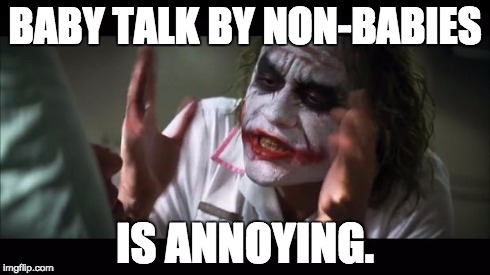From the mouths of...Parents?: Some Thoughts on "Motherese"
Chances are, if you've been in any kind of approximate vicinity to children (or animals, or...) then you've probably heard some form of Motherese, even if you didn't realize it at the time.
First of all, what exactly is 'Motherese'? Simply put, it is that slow, often high-pitched voice caregivers (usually mothers and other older women, in my experience,) use to communicate with younger children.
If you haven't seen it in real life, chances are decent that you've seen it in some form of popular media, used for comedic effect. This is because, simply put, after a certain point, it becomes annoying as hell. Despite this, there are people who claim that it can greatly improve a child's language acquisition in the long run. But the question is, how true are those claims?
The answer, according to this article, is... kinda? Maybe...? Yeah, really, apparently the results of studies done on this very subject turn up inconclusive pretty consistently. While the article points out that, yes, it may have a small part in a child's immediate ability to suss out syllables and sentence division, there really isn't any conclusive evidence that it is all that people have hyped it up to be.
There's actually a pretty interesting point made about other cultures that make a point of not watering down their language for children at all. Apparently, it works just as well, if not better than Motherese, and the children still end up literate by the end, begging the question, "what really is the point?"
I find this whole thing interesting, because I don't really remember my parents doing it; at least, not to any great extent. Sure, they pitched their voices and occasionally faked enthusiasm, they never really truncated words like that-at least that I remember.
What I can tell you is that it sucks eggs to be on the receiving end of Motherese, especially if you happen to be hip to what's happening. Eugh.


Comments
Post a Comment